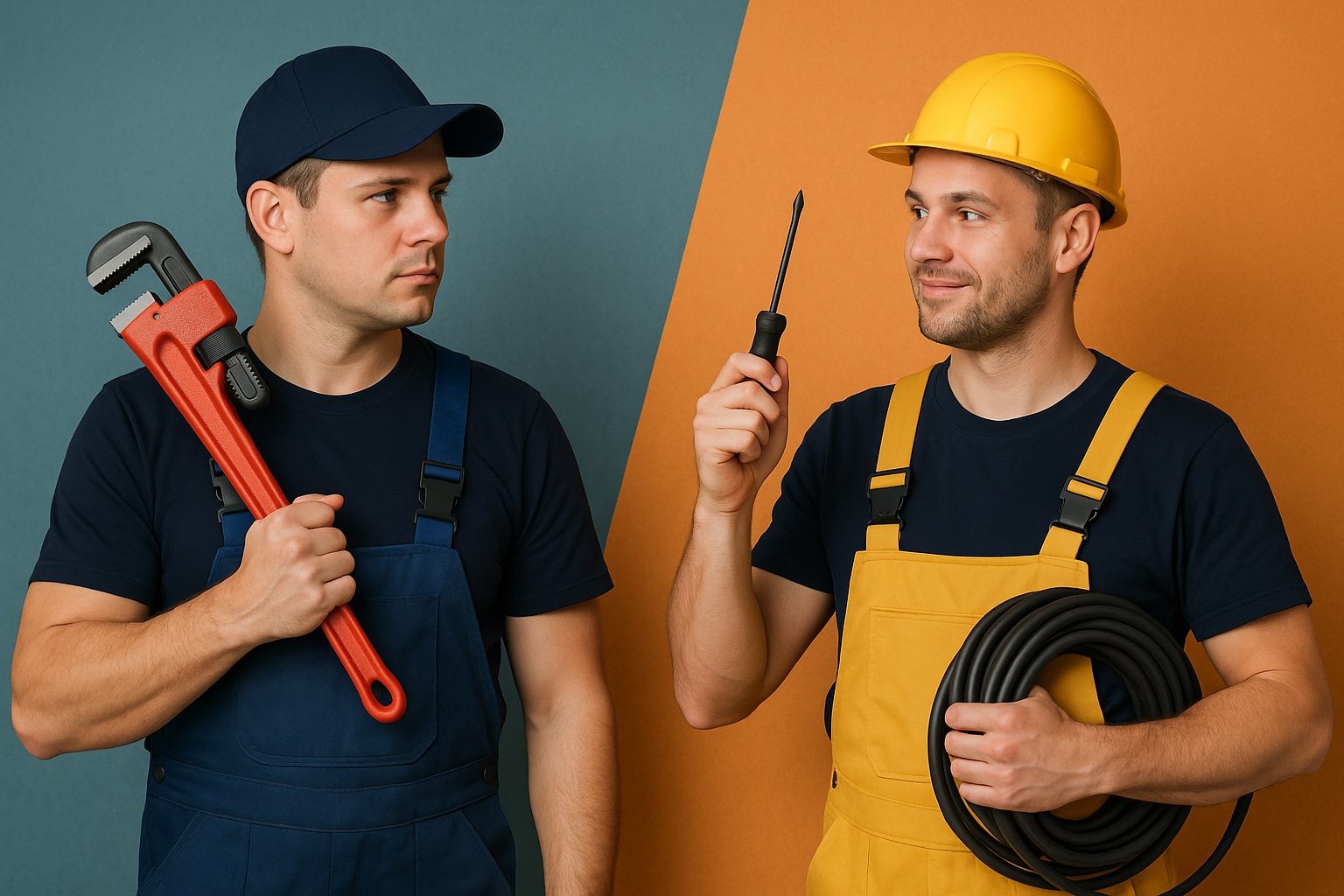When something goes wrong at home—like flickering lights or water leaking under your sink—it’s not always clear who to call. Should you reach out to a plumber or an electrician?
The answer depends on the issue at hand. If it involves water, like leaks, clogs, or installing a new showerhead, you need a plumber. If it involves wires, outlets, or anything electrical, then an electrician is the professional for the job. This guide will help you understand the key differences between the two, when to hire each, and why it’s essential to call the right expert for your home.
What Does a Plumber Do?
Plumbers specialize in systems that deal with water—installation, repair, and maintenance of piping systems, fixtures, and appliances.
Common Plumbing Services
- Fixing leaks and burst pipes
- Unclogging drains and toilets
- Water heater installation and repair
- Installing sinks, faucets, bathtubs, and showers
- Maintaining septic and sewer lines
Tools and Techniques Used
Plumbers use pipe wrenches, drain snakes, soldering torches, and inspection cameras. They’re trained to read blueprints and understand local plumbing codes to ensure every installation is safe and up to code.
Licensing and Certification
Most regions require plumbers to be licensed, especially for complex or large-scale work. Licensed plumbers go through years of training and apprenticeship to ensure safe practices and compliance with state and local regulations.
What Does an Electrician Do?
Electricians handle anything related to your home’s electrical system—from powering your home to wiring your new ceiling fan.
Common Electrical Services
- Wiring and rewiring homes and circuits
- Installing outlets, switches, and light fixtures
- Repairing circuit breakers and fuse boxes
- Installing or upgrading electrical panels
- Troubleshooting electrical problems
Tools and Techniques Used
They rely on multimeters, voltage testers, wire strippers, and conduit benders. A large part of their work involves following the National Electrical Code (NEC) for safety and efficiency.
Licensing and Certification
Electricians often go through stages—starting as apprentices, becoming journeymen, and eventually achieving master electrician status. Certification ensures they’re qualified to work safely with high-voltage systems.
Plumber vs Electrician: Key Differences
| Feature | Plumber | Electrician |
|---|---|---|
| Area of Work | Water systems and fixtures | Electrical systems and wiring |
| Tools Used | Pipe wrench, auger, torch | Multimeter, wire stripper, tester |
| Safety Concerns | Water leaks, mold, contamination | Shock, fire hazards, short circuits |
| Code Compliance | Local plumbing codes | National Electrical Code (NEC) |
| Licensing | Regional licenses | State and federal certifications |
When to Call a Plumber
You’ll need a plumber when:
- You notice leaking pipes under the sink or walls
- Toilets or drains are clogged or backing up
- Water pressure is unusually low
- You’re installing a new dishwasher, water heater, or bathroom fixtures
- There’s sewage smell or wet spots in your yard (indicating possible sewer line issues)
When to Call an Electrician
You’ll need an electrician when:
- Lights are flickering or dimming unexpectedly
- You hear a buzzing sound from your outlets
- Breakers keep tripping or fuses blow repeatedly
- You’re installing major appliances that need dedicated circuits
- You smell burning plastic or suspect a wiring issue
Who Is More Expensive – A Plumber or an Electrician?
The cost depends on the nature and complexity of the job. On average:
- Both professionals charge hourly rates ranging from $75 to $150+
- Emergency services may come with after-hours fees
- Specialized services like sewer repair or panel upgrades cost more due to parts and permits
It’s not about who’s more expensive—it’s about hiring the right person so the job gets done safely and efficiently the first time.
Can a Plumber Do Electrical Work or Vice Versa?
No—and they shouldn’t. Plumbing and electrical work are governed by different codes, tools, and safety protocols. Trying to cross the line without proper licensing can be dangerous and may even void your home insurance.
Hiring a licensed specialist ensures your home is safe, up to code, and protected from long-term damage.
How to Choose the Right Professional
Here’s what to consider when hiring a plumber or electrician:
- Verify licensing and insurance
- Read customer reviews
- Ask about warranties or guarantees
- Request a detailed written estimate
- Check for emergency availability, if needed
Conclusion: Need a Plumber or Electrician in Southwest Michigan?
At Dan Wood Services, we’ve proudly served homeowners and businesses across Southwest Michigan for over a century. Whether you need expert plumbing repairs or a licensed electrician for safe and reliable wiring, our team is here to help 24/7.
We don’t just fix problems—we explain them in plain language, offer transparent pricing, and ensure your comfort and safety every step of the way. From drain cleaning to electrical panel upgrades, we’ve got you covered.
Need help fast? Call Dan Wood Services and let us take care of the rest—because when your home’s at stake, you deserve professionals you can trust.
Visit us at https://www.danwoodservices.com/
FAQs About Plumbers and Electricians
Is it cheaper to hire a plumber or an electrician?
The cost is usually comparable for basic jobs, but complex electrical work may be pricier due to materials and code compliance. Always get quotes from both professionals.
Can a handyman do plumbing and electrical work?
Some minor repairs can be handled by handymen, but licensed professionals should always handle wiring, major installations, and code-sensitive plumbing work.
What are the dangers of DIY electrical or plumbing repairs?
DIY work can result in water damage, mold, electrical fires, or shock hazards. Improper fixes can also lead to expensive repairs later.
Do I need permits for plumbing or electrical work at home?
Yes, in many areas, permits are required for major installations or system changes. Your contractor should handle this for you.




